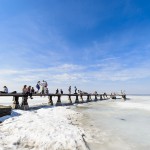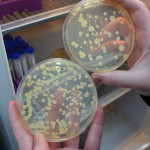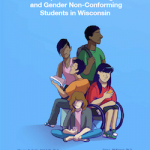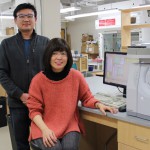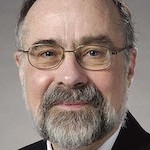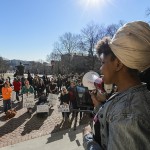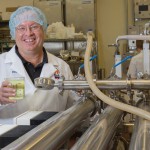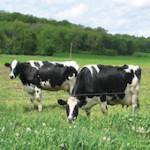Campus news Latest News
Classified Staff Congress approves resolution opposing budget cuts
The Classified Staff Congress Monday quickly approved a resolution in opposition to Gov. Scott Walker’s proposed budget and in support of shared governance.
Recent sightings: Campus warm-up
Photo: Bryce Richter A still-frozen Lake Mendota and the lack of chairs at the Memorial Union Terrace weren’t enough to deter…
UW mascot Bucky Badger is namesake for newly discovered yeast
When you discover a new organism, you get to name it - but not for yourself. There are rules to the naming business in biology. You can, however, name it for the sponsor of your research. When Chris Hittinger and his group of yeast researchers at the University of Wisconsin–Madison found a rather aggressive yeast, it was natural to name it for the fierce carnivore that is the mascot of his home institution: Bucky Badger.
UW-Madison ranks 38th in worldwide reputation
UW-Madison is again being recognized as one of the world's top learning institutions this year, placing 38th in the Times Higher Education World Reputation Rankings.
Four UW–Madison faculty members named Hilldale Award winners
Four University of Wisconsin–Madison faculty members have been chosen for the prestigious Hilldale Awards, an annual recognition that dates back to 1987.
Report: Transgender students need better support in Wisconsin schools
Transgender and gender nonconforming students report experiencing abusive, dismissive and disruptive treatment in the halls, classrooms and bathrooms of Wisconsin high schools. But good experiences are not outside the norm, according to a first-of-its-kind report, “School Experiences of Transgender and Gender Non-Conforming Students in Wisconsin,” released recently by Madison-based nonprofit GSAFE and a pair of University of Wisconsin–Madison researchers.
Nelson Institute honors Madison-born business, distinguished professor
A team of online entrepreneurs and a pioneering professor have been named the recipients of the Nelson Institute for Environmental Studies' second annual alumni awards, established in 2014 to spotlight the accomplishments of the institute's nearly 4,000 alumni.
Young UW–Madison alumni are the future of their communities
Nine young graduates of the University of Wisconsin–Madison making stand-out contributions in their communities are being honored with the Forward under 40 award, presented by the Wisconsin Alumni Association (WAA).
Researchers develop new approach that combines biomass conversion, solar energy conversion
In a study published March 9 in Nature Chemistry, University of Wisconsin–Madison chemistry Professor Kyoung-Shin Choi presents a new approach to combine solar energy conversion and biomass conversion, two important research areas for renewable energy.
Move over Mozart: Study shows cats prefer their own beat
As more animal shelters, primate centers and zoos start to play music for their charges, it’s still not clear whether and how human music affects animals. Now, a study from the University of Wisconsin–Madison shows that while cats ignore our music, they are highly responsive to “music” written especially for them. The study is online at Applied Animal Behaviour Science.
Nine professors win Kellett Mid-Career Awards
Nine members of the University of Wisconsin–Madison faculty have won Kellett Mid-Career Awards.
Academic Staff Assembly joins call for further study of proposed public authority
The Academic Staff Assembly voted Monday on resolutions calling for more study on a proposed public authority for the University of Wisconsin System and greater flexibility in the timing and amount of state budget cuts.
Center for Dairy Research turns yogurt waste into new products
With exploding consumer demand for Greek yogurt, production is up. That's great for food companies' bottom lines, but it also leaves them dealing with a lot more acid whey, a problematic byproduct of the Greek yogurt-making process.
Search narrows for UW–Madison research leader
Four finalists have been named for the University of Wisconsin–Madison’s top research and graduate education post.
Nine professors receive Romnes Faculty Fellowships
Eight promising young members of the UW–Madison faculty have been honored with Romnes Faculty Fellowships.

